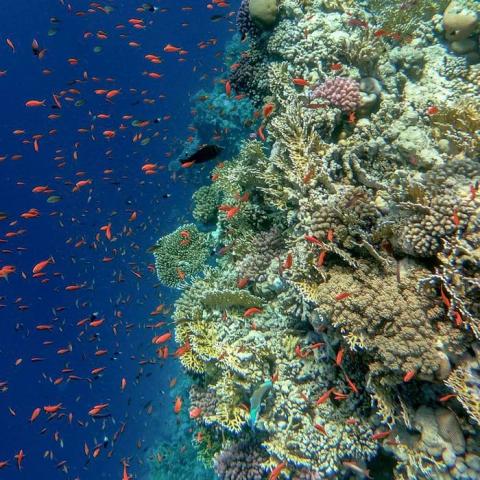Fully sponsored university diploma in protected area conservation | online

UPDATE: Support to help learners prepare for the exam is now available from 14 October to 14 November 2024. The next exam dates are 27 November or 5 December 2024. For all information and for future opportunities see below.
Last updated 29 October 2024
Offered and granted by Senghor University working with the Protected Areas Programme for Africa & Conservation of the International Union for Conservation of Nature (IUCN–PAPACO). This opportunity is available in English and French.
Gain a university diploma in Protected Area Conservation through online study, awarded by Senghor University at no financial cost to you: the Certificate in Protected Area Conservation.
This opportunity is open to everyone around the world. Students from Africa are especially encouraged. UPDATE: the organisers are now also launching a dedicated Latin America network (more here).
How to get your certificate
Requirements
You must complete an estimated 300 hours of study* with online materials provided by Senghor University and IUCN–PAPACO in English or French — at no financial cost to you — before you can sign up for the proctored exam to get your university certificate.
- You must first take the courses to prepare for the university certificate exam: all seven courses offered in English, or seven out of ten courses offered in French. These courses are available at any time and you can complete them at your own pace. You will receive a certificate for each of the individual courses that you successfully pass. Scroll down on this page for the complete list.
- After you have successfully passed the required courses, you can sign up for the proctored exam to achieve the university certificate in protected area conservation. You can choose to take the exam in either English or French. It is usually available several times a year: scroll down on this page for the dates.
To participate in the programme, you will also need a stable internet connection and access to a computer, tablet or smartphone. For now, each candidate may only attempt the exam once; therefore, only register if you are ready to take the exam or prepare for a future exam date.
*Including time in class and time spent on personal study.
Exam dates
The next online exam dates are:
- 27 November 2024 at 8:00 UTC
- 5 December 2024 at 13:00 UTC
>> Register for one of these dates in English
>> Register for one of these dates in French
Future exam dates will likely become available. Watch MOOC Conservation (also in French) for forthcoming information.
>> Details and registration (in English)
>> Details and registration (in French)
Exam preparation with interactive webinars and Q&A: the MOOC Conservation Sprint
- Questions and dicussions — 14 October to 14 November 2024
Send all your questions related to the courses. The organisers will publish the questions so that the MOOC community can think together and propose answers, discuss...
Send your questions...- by email to moocs@papaco.org
- by commenting on the Sprint social media posts (see below for the channels).
- by sending questions to your ambassador who will then forward them (see below for contacts).
- Final webinar — 13 November 2024
To receive the information in due course, make sure that you are signed up for the required courses and connect with the course organisers: see below for your options.
Connecting with the course organisers and other learners
- Follow the course providers on social media
- Join a Facebook group
- Join a WhatsApp channel
- Join a MOOC Conservation Hub by contacting an Ambassador
- After completing at least one course, you may want to become an Ambassador:
Prerequisite courses — also available individually
Core courses available in English and French
By successfully completing this list of courses, you meet the requirements to take the university certificate exam.
You successfully complete a course and receive an individual certificate for it if you achieve at least 75% in the individual exam: save these individual certificates, because you will need to show them to register for the university certificate exam.
- Protected Area Management in Africa / Gestion des aires protégées en Afrique (estimated at 60 hours).
- Ecological Monitoring / Suivi écologique (estimated at 40 hours).
- Law Enforcement / Application des lois (estimated at 40 hours).
- Species Conservation / Conservation des espèces (estimated at 40 hours).
- Protected areas valorisation and sustainable tourism / Valorisation des aires protégées et tourisme durable (estimated at 40 hours).
- New Technologies / Nouvelles technologies (estimated at 40 hours).
- Marine Protected Areas / Aires marines protégées (estimated at 40 hours).
Optional courses available in French
If you are taking the courses and the university certificate exam in French, you may optionally substitute the course on Marine Protected Areas (Aires marines protégées) with one of the following partner courses in preparation for the university certificate exam. You can take them individually, as well. These courses are available through IFDD, also in cooperation with Senghor University. You must achieve on average at least 50/100 to pass one of these courses:
- Économie de l’environnement et gestion des ressources naturelles (Environmental economics and natural resource management).
- Comprendre et analyser les enjeux et les actions du développement durable (Understand and analyze sustainable development issues and actions).
- Droit et protection de l’environnement (Environmental law and protection).
All of the courses listed above are also included with ONet's e-learning catalogues. See these catalogues for further online learning opportunities on biodiversity and nature's contributions to people: available to anyone, everywhere, at no cost to learners.
FAQs as shared by the organisers
I passed the MOOCs a while back, are my attestations still valid?
Yes, we accept attestations from all sessions.
How long does the exam last?
The exam is 2 hours long during which you will have to answer 100 questions (mix of knowledge questions from the courses and case studies).
What is passing grade to get the Certificate?
You need at least 50%.
I already passed the exam before but failed. May I try again?
Unfortunately not at this time.
If you have any other questions, please email the organisers.
About the course providers
Since 2009, IUCN–PAPACO and Senghor University have worked together to develop training programmes dedicated to protected area practitioners.
IUCN–PAPACO
The Programme on African Protected areas & Conservation (PAPACO) is a programme of IUCN’s Protected and Conserved Areas (PCA) team. Its vision is to improve the management and governance of parks and reserves in Africa, and thereby increase their positive impact in terms of biodiversity conservation.
>> Learn more about IUCN PAPACO
Created in 1948, IUCN is now the world’s largest and most diverse environmental network, harnessing the knowledge, resources and reach of our more than 1,400 Member organisations and 16,000 experts. This diversity and expertise makes IUCN the global authority on the status of the natural world and the measures needed to safeguard it.
IUCN supports ONet, and is an IPBES observer organisation and strategic partner.
Senghor University
Senghor University is known as Université Senghor d'Alexandrie in French, officially Université internationale de langue française au service du développement africain (UILFDA). It is a private, french-speaking university based in Alexandria, Egypt. It was established by the government of Egypt through an agreement with the Organisation internationale de la Francophonie and first opened in 1990.
IFDD
The Francophone institute for sustainable development, l’institut de la Francophonie pour le développement durable (IFDD) is a subsidiary body of the Organisation internationale de la Francophonie (OIF). IFDD works to facilitate cooperation in the service of ecological transition and sustainable development, in the 88 member states and governments among the French-speaking world.
Photo by Gregoire Dubois on Flickr: Coral reef in Ras Mohammad National Park, Egypt. While this national park covers land and sea area, it is perhaps most famous for its coral reefs. To learn more about the state of biodiversity in Africa, including Egypt, see the IPBES Regional Assessment Report on Biodiversity and Ecosystem Services for Africa.
